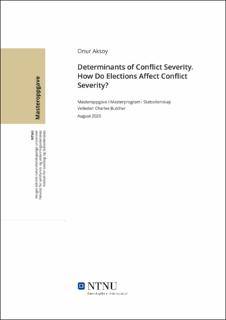| dc.description.abstract | In this thesis I investigate how elections affect conflict severity. The question of interest is whether conflicts become more or less severe during election periods. This paper proposes that elections may reduce conflict severity during the election periods, mainly because both the insurgent groups and incumbents may behave differently during the varying stages of an elections cycle. Insurgent groups and incumbents want to be perceived as responsible and willing to strengthen elections by the voters. Another essential aspect of this paper is to emphasize the election characteristics. Elections per se may not affect conflict severity, but some characteristics of elections may, such as the lack of competition, and whether the election is manifesting a transition period.
I employ negative binominal regression models on a dataset of battle deaths between 1986-2016 to the assumptions of this paper empirically. The analysis finds support for that legislative elections reduce conflict severity, and competitive elections result in more battle deaths. The last-mentioned effect applies mainly in military regimes. This paper finds also support for conflict-reducing effects of increasing vote margins between the winning party and second largest party. These findings are robust to various model specifications, and robust to models that eliminates the most influential cases. | |
